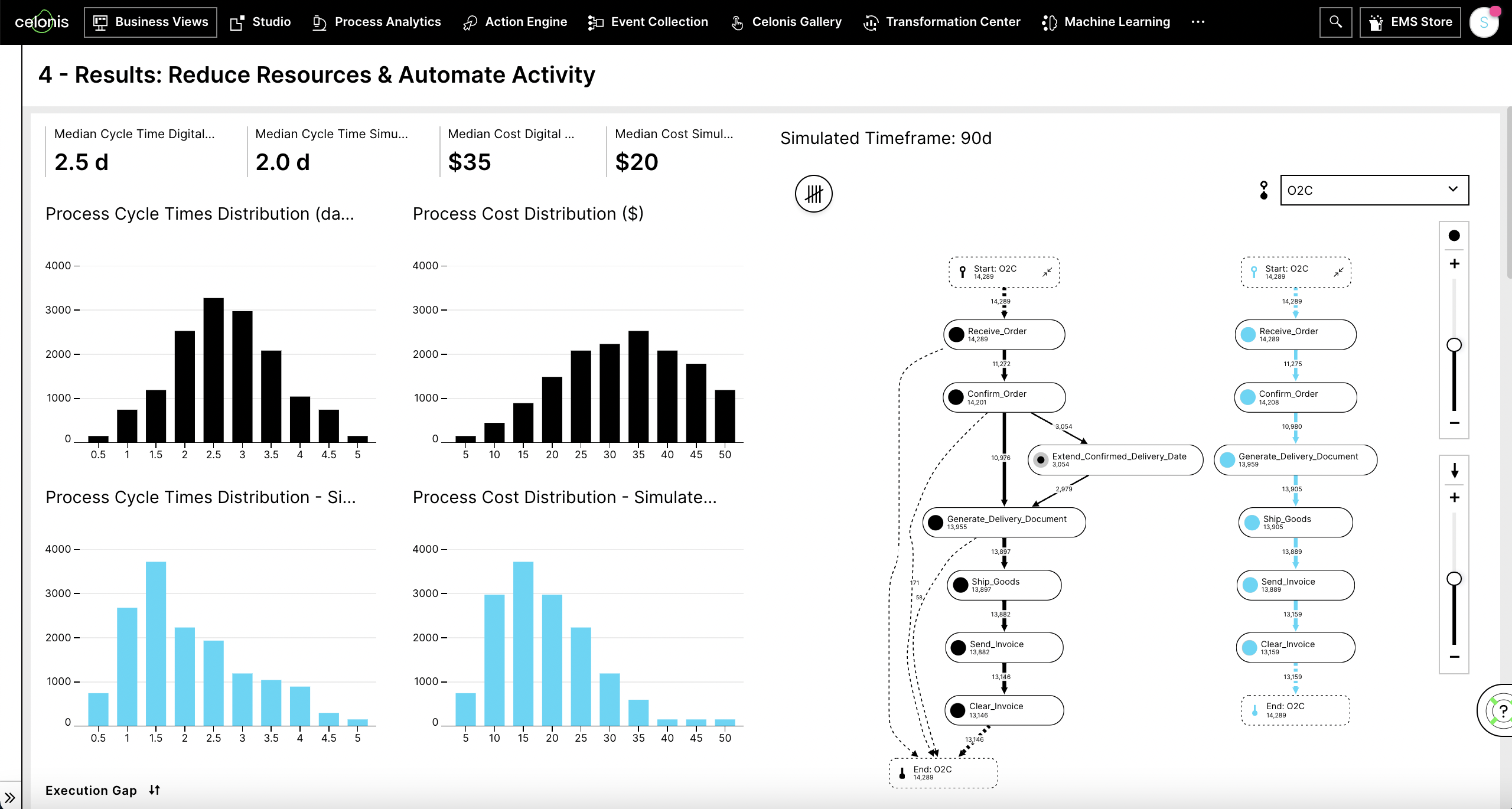When Celonis, an 11-year-old German process mining company, announced a $1 billion raise in August on a $13.2 billion post-money valuation, it was a bit of a shock. After all, VC firms were pulling back from the huge raises and gaudy valuations of yesteryear.
But Celonis — which has raised $2.4 billion, per Crunchbase, with $2 billion coming in the last year alone — has been able to defy the current thinking in startup circles by taking on huge chunks of capital.
Consider that its valuation has grown an eye-popping 420% since 2019, when it raised $290 million at a $2.5 billion valuation. That was followed last year with $1 billion at an $11 billion valuation, culminating in August’s $13 billion valuation.
Part of the reason it’s such a valuable company is that along the way, it’s forged partnerships with corporate giants like IBM and ServiceNow to sell its software, helping push Celonis into markets where even well-funded startups might be limited by the resource requirements.
No code, workflow and RPA line up for their automation moment
It’s also been able to fill in the platform with several strategic acquisitions (more on that later).
Why are customers, investors, and partners so interested in Celonis?
Because Celonis, using software, can dig into the way processes move through a company, looking at complex areas like procurement, bill paying, and inventory and searching for inefficiencies and duplications that can ultimately add up to huge savings.
This is the kind of work that high-priced consultants have tended to do, camping inside companies for months or years and figuring out how work flows through the organization while collecting fat checks to do it.
Having software that can replace those human efficiency experts, and in fairly short order, is a tremendous advantage.
Perhaps that explains why Celonis boasts many large enterprise organizations as customers, including Johnson & Johnson, BP, Siemens, ABB, Dell Technologies, and GE Healthcare. And while it’s not sharing revenue numbers, the rapid rise of its valuation would suggest at least a loosely corresponding rise in revenue, especially with a customer page full of large companies.
We spoke to Celonis CEO Alexander Rinke and a couple of industry analysts to get a sense of why it’s attracting such big investment, and what the future holds for the company
Land and expand
One of the reasons for Celonis’ popularity with investors and customers is that it is a key piece in the enterprise automation puzzle. It sits at the beginning of the automation cycle and helps companies figure out just what needs to be automated most and why.
Whether you’re talking about workflow automation, business process management, or RPA, before you can figure out how to automate, you need to know how it all works and how automation can help improve a given process. That’s where Celonis comes in.
Marc Kerremans, a Gartner analyst, said that one of the biggest benefits Celonis brings to its customers is process visibility.
“Celonis delivers accurate visibility and insight into the way of working in any organization, [showing] the opportunities where automation should take place (the ‘right’ automation), instead of throwing automation at any problem or issue that [you] encounter,” Kerremans told TechCrunch.
Rinke said it is precisely this ability that enables Celonis to show value quickly: The “what if” scenarios let the customer see exactly how they are going to improve if they make a given set of changes. It starts with an initial review of a process or set of processes.
“That’s why building this dataset is so important. We can show companies very quickly how they are performing, and how much better they could perform if they made these changes. That’s really the [secret] sauce of what we do because then it becomes a very rational conversation,” Rinke said.

But Kerremans pointed out it doesn’t stop there. Once in place, Celonis can continue to find further efficiencies within and across departments, which means it keeps adding value.
“Moreover, because process mining is not a one-off initiative and can be used continuously, it will show the actual benefit-realization after the initial automation and create insights on the next automation opportunities,” Kerremans said.
Holger Mueller, an analyst at Constellation Research, said Celonis is solving a big problem for companies, especially when it comes to building efficiencies into complex enterprise resource planning (ERP) software like SAP, which runs the back office of many large organizations.
“With no sign of ERP vendors solving these challenges organically, Celonis has a bright future, spanning across all applications of an enterprise and uncovering operational inefficiencies,” he said.
He believes Rinke has made smart decisions to this point. “Rinke has been an effective leader for Celonis, making smart location decisions (dual HQ in Munich and NYC), acquisitions, and funding,” he said.
But that doesn’t mean there aren’t possible bumps in the road ahead.
Disrupting the disruptor
The challenge for any disruptive technology is not just pushing the large incumbents aside— it’s watching your back for the next innovative idea, and Mueller and Kerremans both see possibilities in this regard.
Mueller noted that even if the software is effective at figuring out how work flows through a process, it still requires human operators to steer, and this could be a weak point should someone develop a more fully AI-driven approach to the problem.
“The challenge for Celonis and other vendors in this category will be AI stepping up to the plate and replacing the human operator in these kinds of analytic processes. Celonis may take advantage of this sea change, but it could also get wiped out by it,” he said.

Kerremans said a skills gap could hurt Celonis in the short term, but he could also see a startup with a cheaper version of what the company does putting pressure on Celonis.
Rinke is taking the long view and sees his company’s platform developing with the changes in technology. “We remain focused on what we’ve always been focused on, which is not just to create a product that delivers value to customers only today, but is really a strategic platform that keeps accelerating and keeps growing.
“We think that business processes will look very different 10 years from now than they look today, and we think that we can be a very meaningful platform to enable that transformation.”
The long view
As we saw with RPA darling UiPath, which had a much more substantial final private valuation of $35 billion, going public does not come without peril, especially when the markets are as unkind as they’ve been this year. But Rinke said he’s not worried about the vagaries of the market.
“We have a very long-term perspective on how we invest in our product, how we invest in the company, and how we think about evolving the company. So, obviously, we watch the [stock] markets, and we see what’s going on, but we don’t really let that determine our thinking too much,” he said.
He said he raised the money he has with an eye on growing Celonis and having options, regardless of whether it goes public.
“It’s hard to predict what the markets are going to do tomorrow, and the reason we want to have a strong balance sheet has always been the same, independent of the markets. It has been the ability to invest and also do acquisitions as we think there are opportunities where we can really enhance our platform position. And we just want to be in a position to do that,” he said.
To that end, the company has made several acquisitions already, including the $100 million purchase of Process Analytics Factory in March to move into the Microsoft ecosystem, as well as Czech startup Integromat, which Rinke described at the time as “an enterprise version of Zapier.”
And with $2 billion raised in the last couple of years, while bringing in revenue, he has the option to make additional acquisitions if the opportunity comes along.
With Adobe paying $20 billion for Figma last month, it’s certainly possible a company could come along and blow him away with an offer impossible to refuse, but Rinke declined to discuss it with TechCrunch.
He said that he sees a company that still has a long way to go, and he’s in it for the long haul.
“If you think about building a business, and a value proposition, and a platform for a long period of time, we started the business 11 years ago, but we think we still have a lot of innovation to do and a long way to go.”































Comment